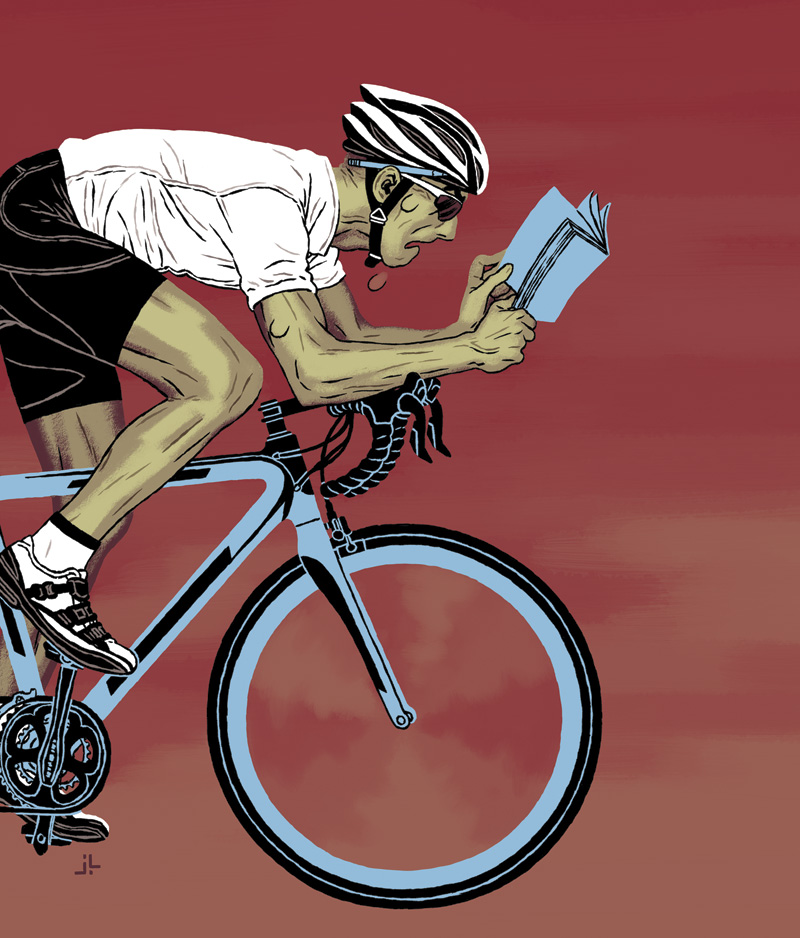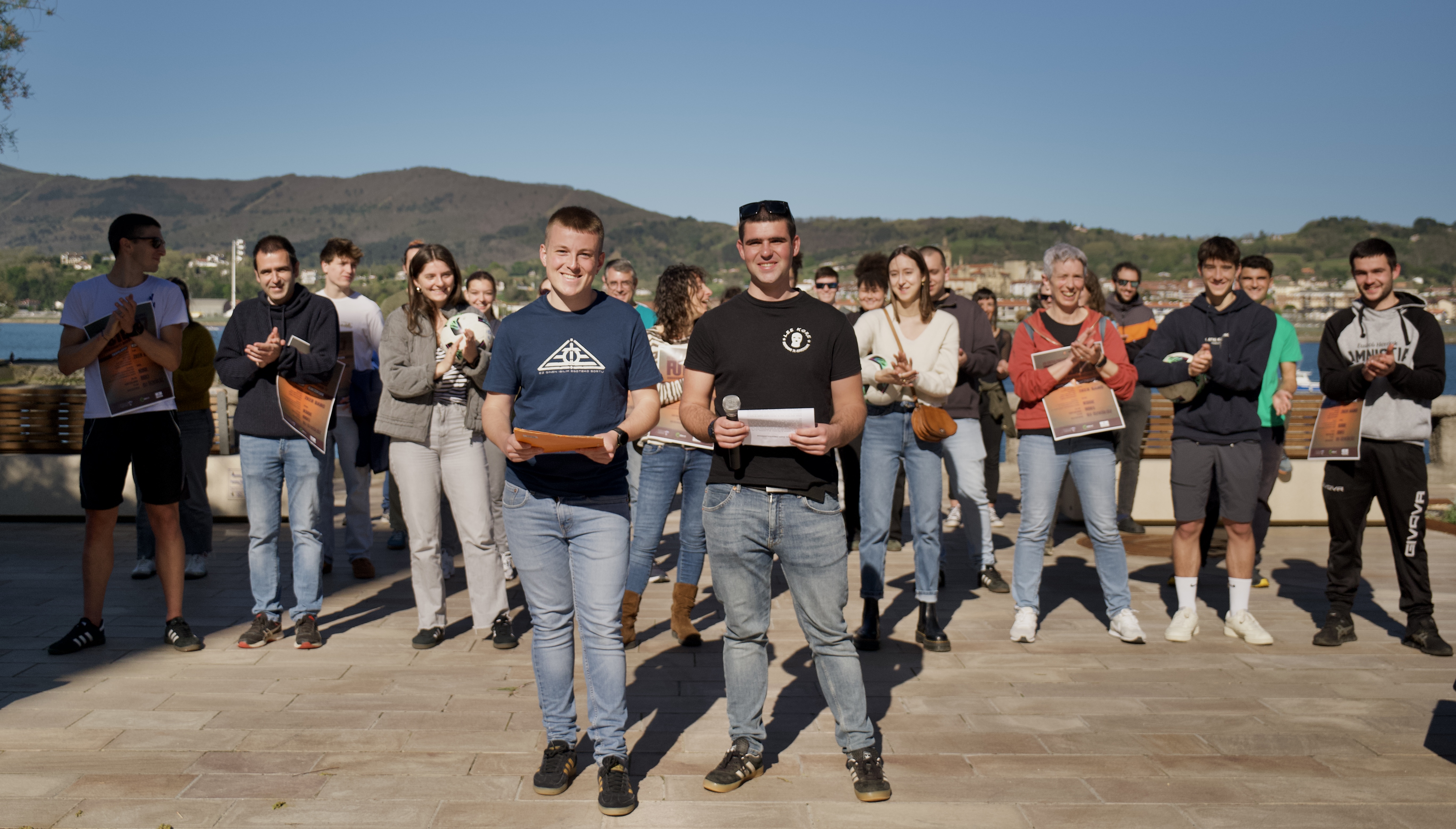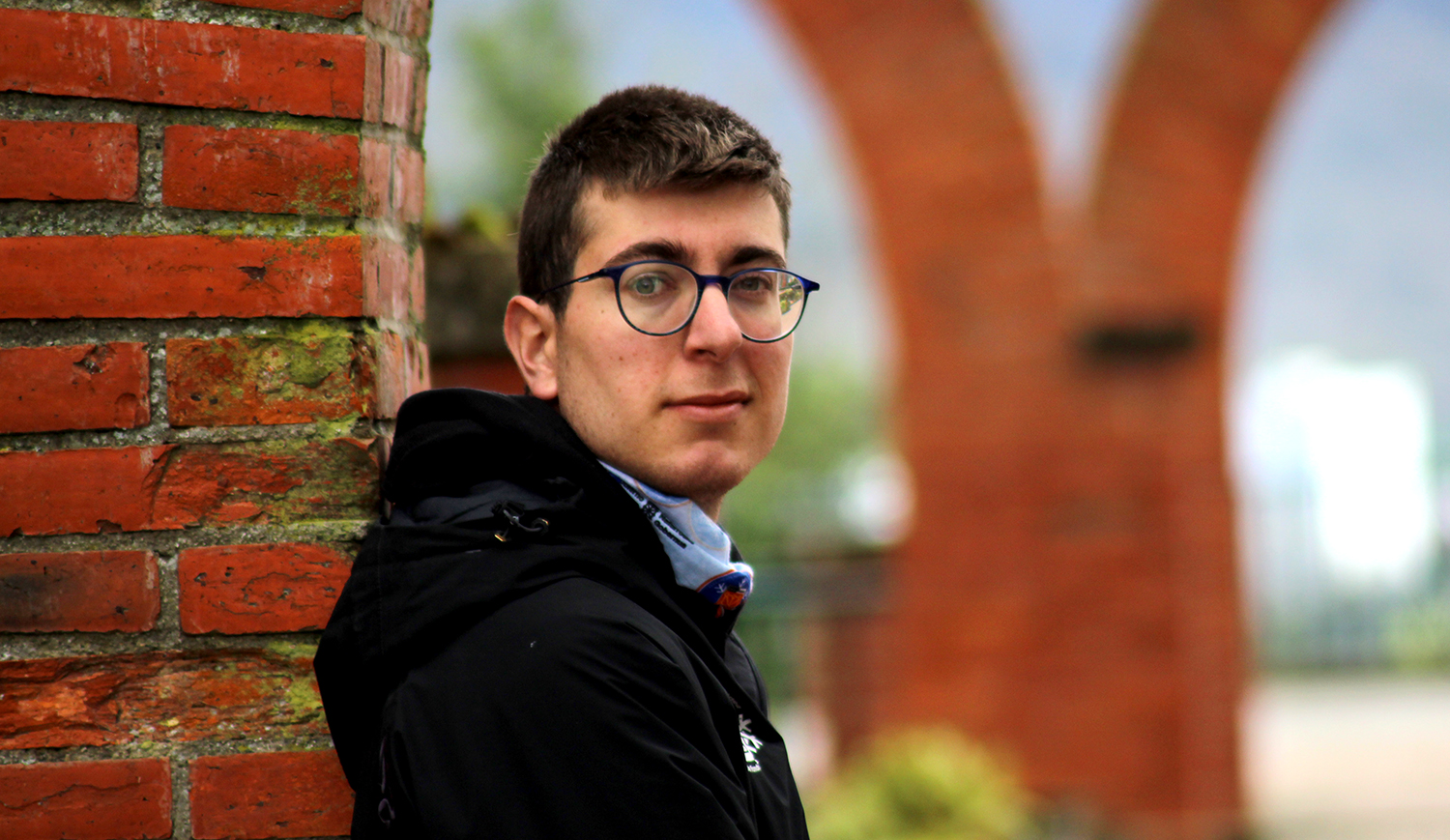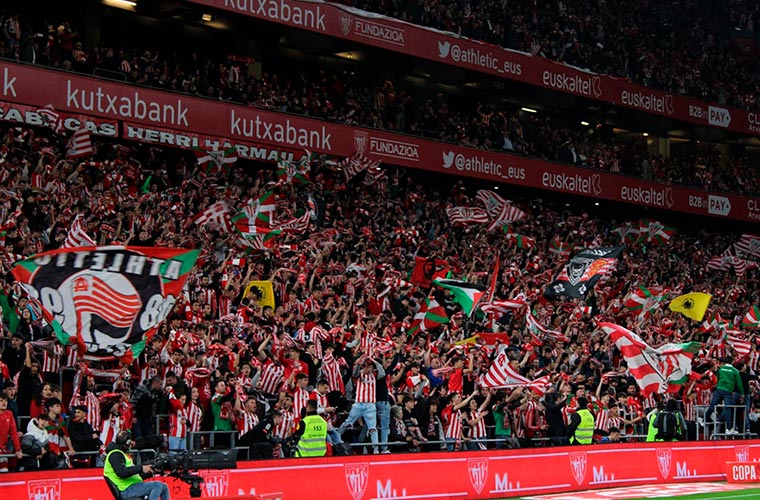When competition fuels creativity
- This series of interviews shows that culture and sport are not so separate. Or, at least, to confess that they don't have to be so separated, that although they look at each other with mistrust and sometimes with contempt, they offer each other. “Football is the opium of the people.” How many times we would hear that phrase, as if it were nothing more than a cunning to fall asleep in the masses, beyond that it can be a tool to create a fairer society. Anartz Zuazua, director of theatre, and Rayco Sánchez, rap musician, have spoken to us about the play Jokoz kanpora and the book Opio errebeldea on football. In the first part of the report, however, we have referred to cycling: After a long talk with writer Julen Gabiria, bertsolari Jone Uria explains why this sport fascinates him. I am left with the spindle of not having made room for more women.

---------------------------------------------------
Julen Gabiria, writer
"Many times we want epic and generate epic."
Julen Gabiria (Galdakao, 1973) writer, translator and enthusiast of crazy cycling (forgives definition like this). It has two novels, both by the editorial Elkar, Connemara in our hearts in 2000 and Han goian looks at the sea in 2004. The narrative of the second novel begins in Euskal Herria, in the years before the war, and develops in the II. In World War Italy, in the Tuscan locality of Ponte a Ema, cradle of cyclist Gino Bartali. He is one of the protagonists of the book.
“Everything started 25 years ago,” explains Gabiria, as he shows us a copy of the magazine Cycling a Fondo from 1991. Italian cyclist Franco Chioccioli appears on the front page and, inside, an interview with Bartali. The Ponte a Emita won twice the Tour de France (1938 and 1948) and three times the Giro de Italia (1936, 1937 and 1947). There is a very large margin between some victories and others. In the middle, war. “Bartali didn’t like to talk about the horrors of war, but in the conversation there are passages of those years,” Gabiria tells us. And he has read five or six lines up, where journalist José Antonio Díaz explains how Bartali took advantage of his prestige to help the Jews who hid in the Basilica of San Francisco de Assisi. As the police did not dare to stop the ‘great champion’, it carried documents saved on the wheels. Now look for information about Bartali on the Internet, for example on Wikipedia. You will read that he died (died in 2000) and that it was not known until after two or three years that he helped the Jews during World War II. “How is that possible? I read it in 1991!” says Gabiria. “Many times we want the epic and we generate the epic.”

Bartali took advantage of the bicycle to make “revolution.” Do you think that cycling can drive a certain transformation today?
I don't know. In Rwanda, for example, in a war-torn country, they formed a group of cyclists to give the young people there a chance. In Bartali's time, yes, it was possible to make the revolution. It happened in 1948. The chronicles say that if the civil war did not erupt due to the clashes that struck Italy, it was because Bartali managed to calm the population. The President of the Council of Ministers, Alcide de de Gasperi, called the cyclist disputing the Tour de France and said: “Gino, terrible things are happening in Italy. I have to ask you a favor: win the Tour.” It asks and does. He won the stage and also the race. The people picked up that opium and relaxed the situation in Italy.
Today, however, I do not see what they can commit themselves to, what is, for example, a social concern that can mobilise the hobby. In its smallness is the work of the Sky or Trek teams, to put ikurriñas together with the names of the Basque cyclists. They have been recognized for their own identity.
What do you think has influenced, by signs of identity, the disappearance of the Euskaltel group?
To begin with, I would say that the cycling enthusiast has won, he has done a good job of the amateur's quality. Now, in general, the one who will see races knows that in the Astana there is a Basque, two others in the Trek… That poppy that joined the hobby has disappeared; going to the Pyrenees with the flags of Athletic or Real… it is not the place. But, on the other hand, it is true that, looking at his quarry work, the beating has been quite strong.
Do you think that mobility policies can be influenced as a bicycle user?
It is complicated, because the preponderance of the car is so entrenched… The Administration can take these kinds of measures, but look at the design of the roads and… The way of driving is also so, although in Euskal Herria we are more aware than in other places. I would force everybody -- I don't know how many days a year -- to cycle around. We should all be everywhere in the chain, because we are all pedestrians, many motorists and some cyclotourists. We all have to be mindful, including cyclists. Some, including many semi-professionals, make me furious in the traffic lights, when they don't stay.
Sport and culture. Both worlds are sometimes looked at with mistrust…
When I’ve gone, I enthusiastically encourage participants to watch Triathlon or cycling tests, but it’s true that some of the fans of the culture around me and less sports have doubts when it comes to encouraging athletes. "Why do I applaud them if their desires are being met? they say, implying that they are doing that "on a whim." In the case of the cyclotourist march Quebrantabones, for example, receive applause for paying 75 euros and do what you feel like, when you are not a professional… Skeptical sports do not understand it.
It must be acknowledged that sport has a social recognition that culture does not have at all and is expressed with applause. Bertsolarism or live musical performances originate in music, but the writer will not receive applause if it is not in a group of readers. That doubt may arise: doing intellectual work and not receiving applause, while the one doing physical work does. We live in a society where that limit of physical activity is given great value. I, however, applaud you, because it is at that moment that a relationship emerges that, for example, is more difficult in football, because players are further away. The corridor looks at you, thanks you for the encouragement, makes you a little gesture and sometimes even corrects you a few words. It's special. And I applaud because they teach me the extent to which human physical and mental capacities can reach. I cannot accept any extreme, because dignity has a limit in sport as well, but physical and mental effort often seems admirable to me.

Cycling also has dark spots, like doping.
I'm a normal cyclotourist, but two years ago I left my fellow platoon behind without realizing it. That year he spent a lot of time and… That brings us to the question: What is doping? Where's the limit? In the past, athletes who were going to participate in the Olympic Games were banned from overtraining, let's say 40 days a year, beyond that was a trap, because the body was not competing in natural conditions. But what is competing according to the laws of nature? Can not a person perform halterophilia if he works in port transporting heavy loads from one side to the other and over time has greatly hindered his body? Most of us do not value anything by nature. It’s such a complicated subject… Medicine always goes one step further, it’s hard to put limits on it.
I'm already tired, with the point of despair. Cycling enthusiasts, even if it is the sport with more controls, will always look at this sport with suspicion. Especially since the 1990s, the amateur has had to make a decision about credibility, and I have also chosen: I believe everything in the same way that I believe in good books and movies, where I completely immerse myself, and also in cycling. I think what I'm seeing if it's credible, as long as it doesn't prove otherwise. And I believe, indeed, from what I said before, because no one has yet clearly defined what doping is, where the borders are, for example, between doping a little or doping a lot. I eat bananas when I'm tired, a hundred years ago they didn't even know what bananas were in Euskal Herria, so I have an advantage compared to a cyclist then. Is that doping? A banana contains carbohydrates, potassium and a multitude of vitamins that do not naturally produce my body... But if in an hour like 40 bananas, he looked atn.Por another side, cycling has always been a poor and unsupportive sport: How is it possible that there are not so many cases of doping in football, tennis ...? Don't they exist, or do the organizations that represent these sports offer a freer bar?
Doping, cycling in general, has inspired a large number of books and documentaries in recent years.
Indeed, it is publishing a lot of works. People have taken the bicycle as a trend, as a modern and good trend, which has made the book market an allure. They have created “Road Books” and other editorials, magazines… I think it is a phenomenon that comes from the Anglo-Saxon world. After entering the Tour a long time ago, in the 1980s, with Greg Lemond, Armstrong, Hamilton, Wiggins, Cavendish, Froome arrived... They've fed dozens of stories, many of them related to doping, and cycling has started to consume a culture that didn't have much knowledge of the subject. It's like a wheel where cycling feeds aesthetics, aesthetics, culture, cultures, cycling, and engaging the ever-increasing production of books.
At the end of the interview we talked about the meaning of the war of football and the clash between war and literature...: “Literature is fixed in the details, and war has no space for details, wins one or the other, has no capacity to name the humanities or events in that globality. War contains the same action and I would say that this is the opposite of literature, because literature is focused on nuances, on minor events, ultimately on people, and war nullifies the person. Therefore, I believe that cycling is closer to literature than football.”
-------------------------------------------------------
There's something in cycling.
Jone Uria Albizuri, bertsolari

I would say that cycling happens like cheese: either you're a fan or you can't smell it. Just as I haven't wondered why I like cheese, I've never thought about what cycling has to get to fish. If I had to respond in the early boycott, I would pour out vistosity, emotion, admiration for the sacrifice that it demands, envy for the skill -- but if it were just for them, I would have that taste for most sports, and no, I'm not one of those who can swallow any sport.
So, cycling has something to do with it. Surely the surprise will be one of the reasons why I catch a particular kind of amateur, including myself. It is very difficult to guess who has the day, what is going comfortably, who is going to attack, when he is going to play, if he is going to resist… There is nothing more to see how the announcers sometimes move. And I get the impression that the cyclists themselves don't know that oftentimes the body will respond to them. There is no doubt that each one will know his own perfectly, but I bet his head that he will be surprised at the things that least think, both for the good and the bad. You have to be beautiful and annoying at the same time, because today's impotence can't be imagined until it starts once. Believing that it's bad and discovering that it's good, giving the best and getting frustrated.
It has another characteristic that has drawn my attention ever since. It does not occur to me, at least, that any other sport is so individualistic and gregarious at once. This inevitably involves trying to find their own place, trying to control egos -- these are very difficult and interesting exercises that cyclists must do unintentionally. The one who takes the wind out of a race, sets a rhythm until it explodes and is going to transport bottles of water knows what it's going to do. He knows that if he wasn't the one who's going to play the general classification he wouldn't get the result he's looking for. He knows he won't know how far he'd go if he could run differently. On the contrary, the team leader knows he has eight people working for him, and that carries a responsibility. Because it's one thing to make a mistake to yourself and another to make a mistake to those who have helped you. Fear that some team member will be stronger than oneself, who doesn't give the level. A great capacity to respond to this pressure is also needed.
The hobby it generates also has a special magic. How people go to the tip or downtown of a port to see the cyclists pass once. I want to applaud, to encourage anybody, which country, which color, which name and what you are wearing. Like everywhere else, there are those who are out of place, but I think it is a minority. There will also be races with few amateurs, and they will have to compete on empty roads. That too must be the case. But in general, he's a devoted and grateful fan, and that also means something.
But surely one of the most powerful reasons to dazzle is that it allows you to read the behavior of every cyclist over the wheel. Some will love the aggressor, others will love the cold head. The one who goes downhill like a crazy one, or the one who plays wisely. A good strategist who knows where to attack. He did not attack anyone and was astute at the last moment. He who gives relief, he who does not give them. The one who is angry with the one who does not give them, the one who accepts. We see them with a lot of gestures and we believe that we know them in one way or another, that we know how they would behave in a situation and how they would not. But then we don't really know them, and what's supposed to be an honest man is positive, or he takes a car to move on, or whatever. But that possibility of knowing the supposed nature of each gives it a point.
When I was going to finish the text, I started reading from the beginning and I realized why I'm a biker. Try and read the text by placing “bertsolarism” in the place of “cycling”, “plaza” in the place of the stage and “practice” in the place of “sports”. Not everything is worth the same, but you do find more than one similarity.
---------------------------------------------------------------------
The French Turra as an epic
Roland Barthes (Le Tour de France comme épopée, 1955)
Koldo Izagirre
We have the onomastic of the French Turra, which tells us by itself and with nothing but that the Turra is a great epic. It would seem that most of the names of cyclists come from a very old ethnic era, in which race sounded through a few phonemes (Brankart franco, French Bobet, Robik celta, Iberian Ruiz, Darrigade kaskoina).
(…)
There are many hugs in Turea. Marcel Bidot, technical director of the French team, embraces Gem for a victory and Antonin Rolland holds a powerful pot on the arched cheek of Geminiani himself. (…) However, to link to this fraternal happiness the feelings of gregariousness that are opening up between the members of the same group, much more turbid feelings. In short, the perfection of public relations is not possible but among the great ones: the epic falls to the level of the novel, just as the “servants” appear on the stage.
(…)
Turra's geography is also totally inferior to the epic need for testing. (…) The slopes, limited to convulsive or fatal “percentages”, are miserable, and in Turea all stages are units of the chapter of the novel (they are the epic duration, the sum of the underlying crises, and not the dialectical development of a conflict as in the tragic duration), the stages, that is, above all, they are physical characters, successive enemies, the mixture of the epic and the indistinct.
(…)
Giving the cyclist is just as criminal as wanting to imitate God, it's just as sacrosanct as wanting to steal God's privilege from force. God knows how to take revenge on such things: The unfortunate Mallejac knows this, a provocative doping leads him to the door of madness. The Bilbao Basket, on the contrary, does not know the jumper, with a cold, rational and unpeaceful climate. Bobet is a deeply human hero who owes nothing to the supernatural and who achieves purely earthly victories, which are magnified by an exemplary humanist punitive: ambition.
(…)
Turra has an ambiguous moral (…) The sacrifice of a cyclist in the victory of his team, imposed by himself or by the technical director, is always exalted, but discussed at the same time. The sacrifice is great, it is noble, it witnesses the moral fullness of the sports practice of the team, it is its main justification; but all the legend of the Turra has another essential value in the contrast: realism. The feeling has no place in Turkey, that is the law that arouses the interest of the show. (…) But we also have the sport Turra, which demands the morality of the community. This is, in fact, the contradiction that has never been resolved and that always obliges the legend to discuss and explain the sacrifice, to remember the generous morality that sustains it. Sacrifice has to be justified over and over again because we regard it as a sentimental value.
Full text: Armiarma.eus
---------------------------------------------------
Anartz Zuazua, theatrical author
“We wanted to parody the crazy world of football; the theater needs to shake the consciences”
The actor and theater director
Anartz Zuazua (Donostia-San Sebastián, 1973) is one of the members of the theatre company Borobil teatroa. The works represented are four: Ali Baba and the 40 robbers, On Egin! We are not alone and offside a comedy about the measure of football. Manu and Martin, an old friend, train a football team made up of older boys who will face in the championship finals. Victory is the only way to prove that they are not out of play in life.
“I wanted to be a football player, like 95% of the children, but it was very bad, I was always on the bench,” Zuazua tells us. “At the door of a game, the coach told me he was going to be the captain of the team. I couldn't believe it! I went to the center of the camp, where the referee was, and I picked the part where I would start playing our team. Each team went by their side and… the coach sent me to sit! Consider what it was for me, I named captain, I chose the difference, and I went directly to the bench of the substitutes to make the whole match there. From my experience, I wanted to parody that crazy world of football, also as a whistle, to show that things are escaping us. Many of the passages of the work are real facts.

Some fathers and mothers who have seen the work say that you have fallen short, as you said in an interview.
To this play are the theatre enthusiasts, more than the people of the world of football, but in collaboration with the Real Sociedad Fundazioa we have offered half a dozen performances within the anniversary events of several football teams in Gipuzkoa, with the objective of reflecting on the wrong behaviors, and the parents and coaches who have seen the play have told us that the reality is even more senseless. It's been an interesting experience, because people have come who don't have a habit of going to the theater. And you've seen that the theater isn't that much -- that is, they've laughed a lot.
You have the school sport in the spotlight.
I believe that sport is poorly targeted. We talk about fair play, participation… but after all you have to win, competition is the most important thing, as in the rest of life in general. The most important thing is to look for a formula other than the result.
And parents… Many think that their children will rise to the height of Messi or Ronaldo, so there are chapitas of size. You see, in the games of the 10-year-old kids, people are out of their boxes and -- I think our lifestyle has something to do with that. We are part of a system that generates a lot of frustration and that influences our position; when you go to the camp you can do whatever you want and insult anyone… In Donostia two mothers were beaten because one of them said blondes to the other’s son; and a child, please, sent a letter to the newspaper asking his father not to go to see him in football because he was ashamed. Those parents should be expelled from the camp.
Can positive values be transmitted through theater?
Of course, that's what we're working on. The function of the theater is to shake consciences a little bit. What happens is that we have to demand the minimum quality and rigour of the theatre, it is not worth anything. We live the time of monologues, of comedies without much depth. They can be funny, but they stay there.
As for the impact of football, why is it so important? Because the media want it. Politicians too, but it is the media that have brought football into this situation. On TV there's some match every day; the other time they were giving a children's championship on TV, we're crazy. I like football, but I've already sunk in my neck.
Culture has less space in the media…
Look at the ball. Two companies were created, ETB got in full, the parties give them every weekend… that creates hobby. We should do the same with culture, because it is what gives a people personality, it is what sets us apart from others. Television networks should set up cultural programmes and broadcast them at normal times. That would worship people and, therefore, would not settle for anything, the Creators would be obliged to give them more rank, and would generate some wealth…
… which does not exist at present.
In our country there are no cultural programs, defined spine, themes that mark the program of each season… In the Festival or in the Musical Fortnight yes, there is always a cycle, but the rest… On the other hand, you have to do a show with a help of 12,000 euros, pay with that money the wages of the actors, etc., and also ask you to give you a good level. We cannot compete with European teams, for example with one from Madrid, and yet we compete, we are in the same league. However, their assemblies may have eight actors, and we are doomed to work with a maximum of three or four.

So, that of being able to live from the theater…
We are getting better quality, but the sector is very institutionalised. That is, we depend on the programmer who chooses or not our work; we are many different quality groups, but because there is no specific axis in the programming, they all put us in the same bag, and if there is no money, two shows can be programmed at the price of one, the quality one goes to the background. The programmer's job is to motivate and attract people to the theater, you can't have the goal of simply filling the space. “But it’s expensive to go to a theater play.” Do you forgive me? The point is that there is no habit.
There's no money for theater, it's a pity. We can't go to the actors and tell them that we're going to spend the whole year training, but we can't pay them. An actress, only performing theatre, if everything goes well, will earn a salary of EUR 1,000; once the family has been set up, you cannot go ahead with that money.
State-owned companies at the same level receive much higher subsidies. In this way we will hardly be able to create a sound infrastructure. What's the demand? We should start working from schools, as in the case of sport. In our time, Real distributed entrances to schools to go to Atotxa. That creates a hobby.
The hobby of sports, if any, is close to here.
I am not against doing sport, not much less, but what we live in Euskal Herria… Why are we going to so many mountains, to do triathlon, to ride a bike? I think because we don't talk. We burn the burdens that we have by making an effort. Or if we go to the stadium, we live with so much stress, we start screaming to untie the knot we have inside. Group therapy has become football.
Can theater also be therapeutic?
Yes, yes. After all, a football match does not start or end on Sunday, starts on Monday and ends on Sunday. A theater play or a film, you can talk about it before or after you see it, discuss the issues it raises… football and theater have many similarities.
What steps can be taken in schools to promote theatre?
For example: Gymnastics is given by someone who has studied physical education, and theater is taught by the professor. Here are the professionals that we can do that work. I teach theatre classes at Ikastola Jakintza, and the difference is that I realized it. We set up dignified shows, and that creates a hobby; the rest of the students see that we create decent things, and next year more people are encouraged. It would be good to continue with that, for example, by taking the students to the theater. There are cycles for them, but they're very small.
Moreover, ETB does not produce. It seems to me to be a mistake. We have no references if they are not Spanish. Come on! The series can be criticized or not, but it's been successful. Do that instead of mimicking others! A Star-System should be created. If here an actor makes two films, people complain. “He always appears!” Well, yes, but in the rest of the places that also happens; it's important because referents are created.
----------------------------------------------------------------
Football, the opium of the people?
Football in the sun and shade
"What do football and God look like? In the devotion of many believers and in the distrust of many intellectuals.
In 1902, in London, Rudyard Kipling made fun of football and “of the dwarf souls who can satisfy the sneezes that play it. A century later, in Buenos Aires, Jorge Luis Borges was more subtle: The Argentine team delivered a speech on immortality on the same day and at the same time as the first World Cup game of 1978 was being played.
Many conservative intellectuals look at it with contempt, because they are convinced that the idolatry of the ball is the superstition that the people deserve. Caught by football, the plebe thinks with the legs, as is natural, and takes place in that dependent pleasure. Animal instinct is imposed on human reason, ignorance crushes culture, and so people have what they want.
On the contrary, many left-wing intellectuals disqualify football because it ramps up the masses and diverts their revolutionary energy. The bread and the circus, the circus without bread: the hypnotized balls that provoke a perverse fascination, the workers atrophy their conscience and, without hardly making gestures, are led by their class enemies as a herd of sheep.
When football ceased to be English and rich, the first popular clubs organized in railway workshops and port shipyards were founded in Río de la Plata. At that time, some anarchist and socialist leaders denounced the betrayal of the bourgeoisie in order to avoid strikes and conceal social contradictions. The expansion of football was an imperialist manoeuvre which sought to keep the oppressed peoples in innocence.
However, the group Argentinos Juniors at its foundation was called Martyrs of Chicago in honor of the anarchist workers hanged on the first of May and the club Chacarita was born on the first of May, baptized in an anarchist library in Buenos Aires. In these early years of the new century, there was no shortage of left-wing intellectuals who exalted football, rather than rejecting it as anesthesia of consciousness. Among them, Italian Marxist Antonio Gramsci, who praised “this kingdom of human allegiance being exercised outdoors.”
---------------------------------------------------
Rayco Sánchez, rap musician
“Football is on the left when it conveys happiness”
Rayco Sánchez, Bilbaíno (Txurdinaga, 32 years old), team member Norte Apache Rap, social educator and soccer enthusiast. He has a blog at ARGIA, “Opio Errebeldea,” and just published a book of the same name with the Taupaka association. It has received 40 short stories that talk about football, revolution and social change.
In the presentation of the book, in the bar Kirruli of Bilbao, you said that you have three hobbies: Social change, rap and football. When you mention the latter, you made a special gesture, such as asking for forgiveness…
I have an amazing hobby, but I don't like football today. I don’t know if it’s a contempt, a shame… Before football was everybody’s, but now it responds to the laws of the market and has more and more pink press. Cristiano Ronaldo is accused of fraud amounting to EUR 15 million, and yet the question that the media have brought to the fore is whether or not to leave Real Madrid, leaving fraud in the background.
A follower of Real Madrid has started a collection of signatures on the web Change.org to ask Ronaldo to forgive him the debt and stay on the team. 2,500 firms are on their way to…
Can not all those who have signed be imprisoned? Or, better, you can't make the library card and force them to spend some time on it? The thing is, it's mass-media powered. The media is putting the curtain of smoke and the curtain of fraud in the background. And we swallowed it whole.
I too have my contradictions. I follow the English League, I like to watch matches like Liverpool or Arsenal, although I know that they are an example of the commodification of football and that partners have to pay a fortune to watch their team live. I'm not in favor of that, but… Talking about amateurs, when I go to San Mamés I take the last drink in a bar in the area, and partners who sit a little higher, because they pay more, can consume alcohol peacefully...
Many interests converge on one side.
We know that it is a business, that the group chairmen have political and economic interests. We carry “Kutxabank” on the t-shirt. Does this company represent us? Commissions, mortgages, evictions… Why Kutxabank? Or Petronor? Once put in, why don't we put the Fly Emirates company logo on it? The point is that they are companies from the party of the president of Athletic, and that positive feedback is generated between amateurs and companies.
The aid received by Athletic has scarcely generated controversy…
Subsidies are not reasonable. The New St. Mamés was built quickly, workers’ rights were violated… Nothing can justify that. Why do we not use public money to create jobs? Why don't you hire the people in the house? There is no better people than those who meet their needs by themselves. That's the welfare state. And not that they hire a Portuguese company and that their workers are in poor condition. In addition, to see a game you have to pay more than EUR 40.
.jpg)
In a state of well-being, culture must also have the protection it deserves.
Yes, it is sometimes rabid to see what support sport and culture receive on the one hand. It must be ensured that all citizens can enjoy both. In that sense, before all kinds of people met in the stadium, the factory owners, the workers… and now, oysters, I have had to save money to take out the membership card. The most economically humble have no option to go to a football match, Athletic does not encourage their parents to go to the stadium with their children, and yet in our town eight out of ten are Athletic enthusiasts, I do not understand. The other two are from Madrid, Barça or Milan, because they are the ones that make mass-media available to us. The same goes for music: Maluma, Alejandro Sanz, Amaral… If there is no possibility to know another model, such as jazz, it will not attract many followers.
Do you think education is basic?
Yes. Going from school at the age of fifteen to the theater to see an old poop, a theater play against drugs, because… I will continue smoking pores, and after seeing that play maybe more. Football entry costs between EUR 40 and 50. How much culture can you consume with that money?
We must also talk about the direct ones. A dollar is paid for Berri Txarrak, Su Ta Gar or Fermin Muguruza. They are awesome artists, but… When you go, the organizers: “It’s over 400 euros, we’ll give you 100 and the loin snacks for dinner; and we’ll take away this bafle and the other.” That's not how culture is created.
In the rap world, we have The Corn Guys. People say: “They say things as they are.” Of course. But we can't say that, because we'd go to jail. “They, as Valencians, are aware.” Txo, we came from Txurdinaga, Sestao and Barakaldo, what do you say about consciousness? We have no choice but to use metaphor, using poetry. That has not been given enough courage and, on the contrary, the children of corn have become the representative of the Basque youth. We cannot be in constant contact with the conditions of the concerts. With Quilombo (2011) we took a quality leap and yet, after two years of tour, before we started recording we had 50 euros in Juanito Laguna (2015). It's not sustainable.
In the foreword of the book, Beñat Zarrabeitia speaks of the liturgy of approaching the football field.
We're enthusiastic about Athletic. At some point we have been called to give a concert and we have not, because at that time there is a match in San Mamés. I'm a partner, and that liturgy, meeting with my friends and walking in poteo, wouldn't take it away from me. Ibon is a member of the Sestao river and we have also been in the Las Lllanas camp. The Sestao has nothing to do with modern football, except with the punk movement, immigration… Before the football teams represented the people, their characteristics were coinciding; today, all clubs look at the result and have the same pattern.
There are exceptions.
That's right. It is to be welcomed the fun and joyful game of some English and German teams. The goal on the left is that happiness is for everyone, and sometimes football, play, can be on the left.
“Society has started treating soccer players as if they were rock stars; however, they have to comply with values and behaviors,” the book says...
I mean, there are things that are legitimate in the case of rock stars, that we forgive them, and in the case of soccer players, they don't. In this sense, footballers are at all times in danger or improvisation. A foul in the last minute of a World Championship match and Gol... is terrible. Football is the temple of improvisation, you go from concert to concert inventing things.
Today, is there room for improvisation in football fields?
Less and less. The other day I saw the match of the Spanish team sub-21. Saul scored three goals, but people especially applauded Ceballos's game, which was very pleased with the final result in the first part. We leave the usual script and when things go out we applaud the athletes, but if we put our foot… Do you remember Zidane’s penalti in the “panenka” style of the World Cup? He left his mark for history. But what if he had been wrong?
In the book you gather the experience in Argentina. Do you feel different football there?
Football is more romantic. The stories of South America are really hard. There are people who can't feed their family with dignity. It is unbelievable that the high-level player will come out of this situation, which will put the penalty without making some 80,000 people nervous. “Maradone fell to defeat,” some say. Do you know their true story? How would I not get lost? His father worked all day and yet he ate at the home of those who were scarce. Suddenly a house, two, equal treatment to the gods, injuries, a road down, up, down… And who helped him? Who would not be lost in that situation? To me.
Football becomes a solution for many, not necessarily for those who reach professionals. I mean, it can be a useful tool for getting a better society.
As an educator, I work with families with young boys and girls, and it's true that through football you can work a lot of things: teamwork, managing victories and failures, effort, health, nutrition -- and the same with music. In rap workshops, I've worked on bullying, feminism, respect -- Rapa is from the village, so she was born in the Bronx, because anyone could use it at any time. It is an effective tool for the transmission of values.
Julen Gabiriak literatura eta futbola uztartzea xede duen “Letrak eta Futbola” egitasmoan parte hartu du aurten. Athletic Fundazioak zazpigarrenez antolatu du ekimen hori, eta bosgarrenez “Thinking Football” zinema jaialdia.
“Letrak eta futbola” ekimenaren baitan bi komiki plazaratu ziren 2015ean, gaztelaniaz bata –Santiago García eta Pablo Ríosen El Portero– eta euskaraz bestea –Diamanteak, urrea eta ikatza–, Unai Iturriagaren gidoia eta Alfonso Zapicoren ilustrazioak dituen fikziozko historia, non bat egiten duten frankismoak, homosexualitateak eta futbolak.
Lehengai anitzekin papera egitea dute urteroko erronka Tolosako Lanbide Heziketako Paper Eskolako ikasleek: platano azalekin, orburuekin, lastoarekin, iratzearekin nahiz bakero zaharrekin egin dituzte probak azken urteotan. Aurtengoan, pilota eskoletan kiloka pilatzen den... [+]
Historia errepikatzen dela idatzi zuen Marxek, “lehenik tragedia gisa, gero fartsa moduan”. Armagintzaren eta militarismoaren inguruan errepikapen hutsa ez, espiralean goraka doan buklea ari gara bizitzen, fartsatik asko duena, eta tragedian amaitzeko gero eta aukera... [+]
Azken aldian, asteburuetan, Internet ez dabil ondo. Hasieran, zaila zen webguneei ezarritako blokeoen zergatia ulertzea; orain, badakigu Espainiako La Ligak agindu zituela, futbola modu ilegalean emititzea saihesteko. La Ligaren blokeoak euskal domeinuei eragiten dien... [+]
Orain arte desgaituak ez diren pertsonekin lehiatu da Uharteko Ipar Eski Taldeko Eneko Leyun eskiatzailea (Iruñea, 1998). 2024-2025 denboraldian, lehenengo aldiz parte hartu du Adimen Urritasuna duten Pertsonentzako Iraupeneko Eskiko Espainiako Txapelketan. Urrezko... [+]
Euskal Pilotako Nazioarteko Federazioaren eta Espainiako Federazioaren arteko gatazkak bere horretan jarraitzen duen bitartean, Jose Manuel Rodriguez Uribesek euskal selekzioaren aldeko adierazpenak egin ditu. Desadostasunak direla eta, Nazioarteko Pilota Federazioaren eta... [+]
Ertzaintzak martxoaren 13an Bilbon zauritutako bi pertsonaren testigantza jaso ditugu. Athleticen partidaren ostean larriki zauritu zituzten aita-semeak, borra-kolpeka, eta atxilo eraman zuten haietako bat. Furgonetatik ikusi zuen ertzainek nola egin zuten tiro jendearen kontra,... [+]
Eskolaz kanpoko jardueren eskaintza zabala egiten duten ikastetxeen aldean, beste askok ez du horretarako aukerarik; eta eskola bereko ikasleen artean ere, denek ezin dute ekintzetan parte hartu, baliabide ekonomikoek baldintzatuta. Esku hartzeko dei egin diete instituzioei:... [+]
Iazko udan ere Alacant aldera hurbildu ginen eguraldi hobea aurkitu nahian eta, urtero bezala, egun batez, Benidorm erraldoian sartu ginen hango giroan murgildu, zerbait hartu eta seme-alabekin izozki edo gofre bat dastatzeko asmoz.
Hiri bitxia da, denetarik aurki dezakezu... [+]
15 urteko emakume bati egin dio eraso Izarra klubean jarduten zuen pilota entrenatzaile batek.
Iñigo Cabacas Herri Harmaila taldea eta Athleticen arteko harremana nahaspilatuta dago azkenaldian. Iñigo Cabacas Herri Harmailako Iñigorekin hitz egiteko aukera izan dugu astelehenean.














.jpg)








